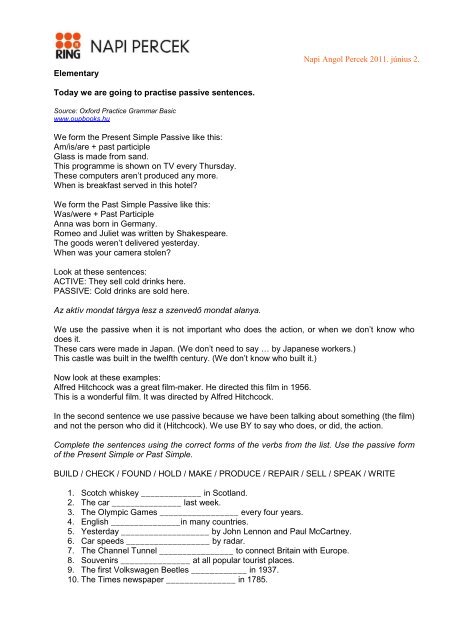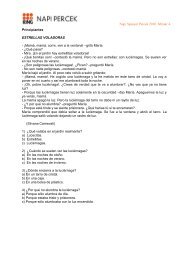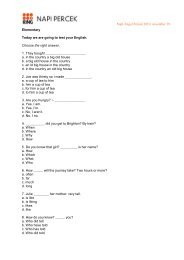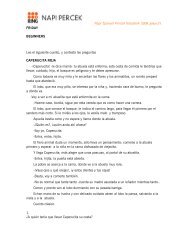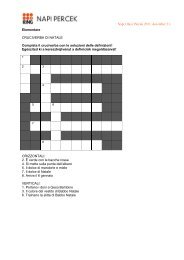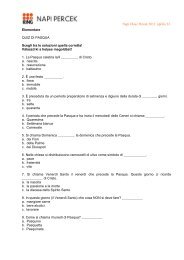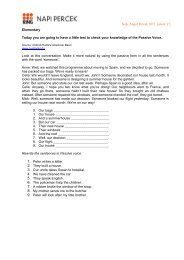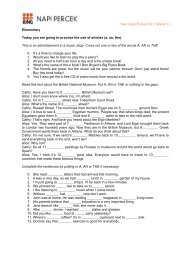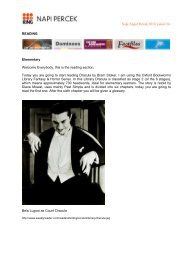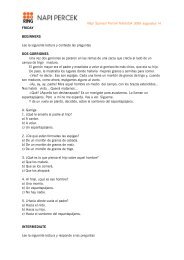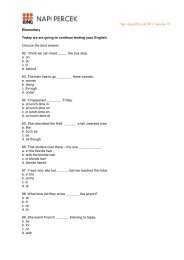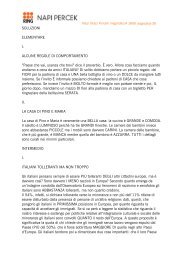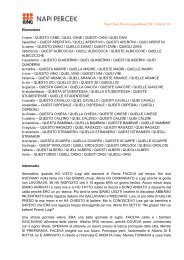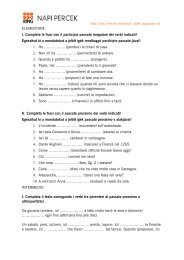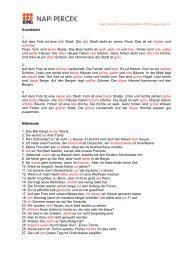Napi Angol Percek 2011. június 2. Elementary Today we are going ...
Napi Angol Percek 2011. június 2. Elementary Today we are going ...
Napi Angol Percek 2011. június 2. Elementary Today we are going ...
You also want an ePaper? Increase the reach of your titles
YUMPU automatically turns print PDFs into web optimized ePapers that Google loves.
<strong>Elementary</strong><br />
<strong>Napi</strong> <strong>Angol</strong> <strong>Percek</strong> <strong>2011.</strong> június <strong>2.</strong><br />
<strong>Today</strong> <strong>we</strong> <strong>are</strong> <strong>going</strong> to practise passive sentences.<br />
Source: Oxford Practice Grammar Basic<br />
www.oupbooks.hu<br />
We form the Present Simple Passive like this:<br />
Am/is/<strong>are</strong> + past participle<br />
Glass is made from sand.<br />
This programme is shown on TV every Thursday.<br />
These computers <strong>are</strong>n’t produced any more.<br />
When is breakfast served in this hotel?<br />
We form the Past Simple Passive like this:<br />
Was/<strong>we</strong>re + Past Participle<br />
Anna was born in Germany.<br />
Romeo and Juliet was written by Shakespe<strong>are</strong>.<br />
The goods <strong>we</strong>ren’t delivered yesterday.<br />
When was your camera stolen?<br />
Look at these sentences:<br />
ACTIVE: They sell cold drinks here.<br />
PASSIVE: Cold drinks <strong>are</strong> sold here.<br />
Az aktív mondat tárgya lesz a szenvedı mondat alanya.<br />
We use the passive when it is not important who does the action, or when <strong>we</strong> don’t know who<br />
does it.<br />
These cars <strong>we</strong>re made in Japan. (We don’t need to say … by Japanese workers.)<br />
This castle was built in the t<strong>we</strong>lfth century. (We don’t know who built it.)<br />
Now look at these examples:<br />
Alfred Hitchcock was a great film-maker. He directed this film in 1956.<br />
This is a wonderful film. It was directed by Alfred Hitchcock.<br />
In the second sentence <strong>we</strong> use passive because <strong>we</strong> have been talking about something (the film)<br />
and not the person who did it (Hitchcock). We use BY to say who does, or did, the action.<br />
Complete the sentences using the correct forms of the verbs from the list. Use the passive form<br />
of the Present Simple or Past Simple.<br />
BUILD / CHECK / FOUND / HOLD / MAKE / PRODUCE / REPAIR / SELL / SPEAK / WRITE<br />
1. Scotch whiskey _____________ in Scotland.<br />
<strong>2.</strong> The car _______________ last <strong>we</strong>ek.<br />
3. The Olympic Games _________________ every four years.<br />
4. English _______________in many countries.<br />
5. Yesterday ___________________ by John Lennon and Paul McCartney.<br />
6. Car speeds __________________ by radar.<br />
7. The Channel Tunnel ________________ to connect Britain with Europe.<br />
8. Souvenirs _______________ at all popular tourist places.<br />
9. The first Volkswagen Beetles ____________ in 1937.<br />
10. The Times newspaper _______________ in 1785.
<strong>Napi</strong> <strong>Angol</strong> <strong>Percek</strong> <strong>2011.</strong> június <strong>2.</strong><br />
Now write the questions for the sentences in the above exercise, using the Passive form.<br />
1. Where _____________________________________________?<br />
<strong>2.</strong> When _____________________________________________?<br />
3. How often _____________________________________________?<br />
4. Where _____________________________________________?<br />
5. Who _____________________________________________?<br />
6. How _____________________________________________?<br />
7. Why _____________________________________________?<br />
8. Where _____________________________________________?<br />
9. When _____________________________________________?<br />
10. When _____________________________________________?<br />
Change the active sentences into passive sentences. Use the words in brackets ( ).<br />
1. We sell tickets for all shows at the box office. (tickets for all shows / sell / at the box office)<br />
______________________________________________________________.<br />
<strong>2.</strong> Thomas Edison invented the electric light bulb. (the electric light bulb / invent / by Thomas<br />
Edison) ______________________________________________.<br />
3. Someone painted the office last <strong>we</strong>ek. ( the office / paint / last <strong>we</strong>ek)<br />
______________________________________________________________.<br />
4. Several people saw the accident. (the accident / see / by several people)<br />
______________________________________________________________.<br />
5. Where do they make these video recorders? (where / these video recorders / make)<br />
________________________________________________________.<br />
6. Six countries signed the agreement. (the agreement / sign / by six countries)<br />
______________________________________________________________.<br />
7. A stranger helped me. (I / help / by a stranger)<br />
______________________________________________________________.<br />
8. They don’t deliver the post on Sundays. (the post / not deliver / on Sundays)<br />
______________________________________________________________.<br />
Put in the correct active or passive form in brackets ( ).<br />
Fiat 1. _________ ( started / was started) by a group of Italian businessmen in 1899. In 1903,<br />
Fiat <strong>2.</strong>_________ (produced / was produced) 132 cars. Some of these cars 3. ______________<br />
(exported / <strong>we</strong>re exported) by the company to the United States and Britain. In 1920, Fiat<br />
4.___________________ (started / was started) making cars at a new factory at Lingotto, near<br />
Turin. There was a track on the roof where the cars 5._____________ (tested / <strong>we</strong>re tested) by<br />
technicians. In 1936, Fiat launched the Fiat 500. This car 6. ____________ (called / was called)<br />
the Topolino – the Italian name for Mickey Mouse. The company grew, and in 1963 Fiat<br />
7._________________ (exported / was exported) more than 300, 000 vehicles. <strong>Today</strong>, Fiat is<br />
based in Turin, and its cars 8. ________________ ( sold / <strong>are</strong> sold) all over the world.
Intermediate<br />
<strong>Napi</strong> <strong>Angol</strong> <strong>Percek</strong> <strong>2011.</strong> június <strong>2.</strong><br />
<strong>Today</strong> <strong>we</strong> <strong>are</strong> <strong>going</strong> to practise passive sentences.<br />
Source: Oxford Practice Grammar Intermediate<br />
www.oupbooks.hu<br />
Complete the table below.<br />
Present Simple<br />
Active: We bake the bread here.<br />
Passive: The bread ____________________.<br />
Present Continuous:<br />
Active: We <strong>are</strong> baking the bread.<br />
Passive: The bread ____________________.<br />
Present Perfect:<br />
Active: We have baked the bread.<br />
Passive: The bread ____________________.<br />
Past Simple:<br />
Active: We baked the bread yesterday.<br />
Passive: The bread ____________________.<br />
Past Continuous:<br />
Active: We <strong>we</strong>re baking the bread.<br />
Passive: The bread ____________________.<br />
Past Perfect:<br />
Active: We had baked the bread.<br />
Passive: The bread ____________________.<br />
Future:<br />
Active: We will bake the bread next.<br />
Passive: The bread ____________________.<br />
Active: We <strong>are</strong> <strong>going</strong> to bake the bread.<br />
Passive: The bread ____________________.<br />
Modal verb:<br />
Active: We should bake the bread soon.<br />
Passive: The bread ____________________.<br />
Active: We ought to bake the bread.<br />
Passive: The bread ____________________.<br />
Complete the information about the Barford Hall. Put in the correct form of these verbs.<br />
BUILD (PAST SIMPLE) / USE (PAST CONTINUOUS) / NOT LOOK (PAST PERFECT) / USE<br />
(PRESENT SIMPLE) / OWN (PRESENT SIMPLE) / BUY (PAST SIMPLE) / DO (PRESENT<br />
PERFECT)<br />
The building at the end of the High Street is Barford Hall, which 1.________________ in 1827.<br />
<strong>Today</strong> the Hall <strong>2.</strong> ____________ by Bardale Council. It 3. _________________ as a w<strong>are</strong>house<br />
when it 4.____________ by the Council in 1952, and it 5. ______________________ after very
<strong>Napi</strong> <strong>Angol</strong> <strong>Percek</strong> <strong>2011.</strong> június <strong>2.</strong><br />
<strong>we</strong>ll. Since then a lot of work 6.___________________________ on it, and these days the Hall<br />
7.________________ as an arts centre.<br />
A press conference is being held. Put in the correct form of the verbs.<br />
Reporter: Can this new drug prolong human life?<br />
Professor: Yes, <strong>we</strong> believe that human life ____________________ by the drug.<br />
Reporter: Are you <strong>going</strong> to do any more tests on the drug?<br />
Professor: Yes, further tests _______________________ soon.<br />
Reporter: What ______ the drug ______________?<br />
Professor: It will be called Bio-Meg.<br />
Reporter: Can people buy the drug now?<br />
Professor: No, it ______________________ by the public yet.<br />
Reporter: Do you think the company should sell this drug?<br />
Professor: Yes, I think Bio-Meg _______________________ to anyone who wants it.<br />
Choose the correct verb form in this news report about a storm.<br />
Millions of pounds’ worth of damage 0. has caused / has been caused by the storm which 1.<br />
s<strong>we</strong>pt / was s<strong>we</strong>pt across the north of England last night. The River Ribble 3. burst / was burst its<br />
banks after heavy rain. Many people 4. rescued / <strong>we</strong>re rescued from the floods by fire-fighters,<br />
who 5. received / <strong>we</strong>re received hundreds of calls for help. Wind speeds 6. reached / <strong>we</strong>re<br />
reached ninety miles an hour in some places. Roads 7. blocked / <strong>we</strong>re blocked by fallen trees,<br />
and electricity lines 8. brought / <strong>we</strong>re brought down, leaving thousands of home without<br />
electricity. ‘Everything possible 9. is doing / is being done to get things back to normal,’ a<br />
spokesman 10. said / was said.<br />
You <strong>are</strong> telling a friend some news. Use the notes and complete the second sentence.<br />
Sometimes you need to use the active and sometimes the passive.<br />
1. (Past Simple: Claire go to Florida last month) You remember Claire? She<br />
___________________________________.<br />
<strong>2.</strong> (Present Perfect: send our luggage to Australia) Bad news about our luggage. It’s<br />
________________________________.<br />
3. (Past Simple: Claude Jennings win the quiz competition) Did you hear about the quiz<br />
competition? It__________________________________________.<br />
4. (Past Simple: Mrs Miles do a parachute jump last <strong>we</strong>ek) You know Mrs Miles? She<br />
________________________________________________.<br />
5. (Present Perfect: a bull attack David) Have you heard about David? He’s<br />
_________________________________________________.<br />
6. (Present Continuous: build the house) Trevor and Lara have bought a house. It’s still<br />
___________________________________________.<br />
7. (Present Simple: Andrew like Jessica) Did I tell you about Andrew? He<br />
_________________________________________________.<br />
8. (Present Perfect: throw away your stamp collection) Bad news about your stamp<br />
collection. It’s __________________________________________.<br />
9. (Present Perfect: Martians kidnap my neighbours) Did I mention my neighbours? They’ve<br />
_________________________________________.<br />
10. (Past Simple: five people see the ghost) Did you hear about the ghost? It<br />
__________________________________________________________.
Advanced<br />
<strong>Napi</strong> <strong>Angol</strong> <strong>Percek</strong> <strong>2011.</strong> június <strong>2.</strong><br />
<strong>Today</strong> <strong>we</strong> <strong>are</strong> <strong>going</strong> to practise passive sentences.<br />
Source: Oxford Practice Grammar Advanced<br />
www.oupbooks.hu<br />
Read through this news report.<br />
For as long as people can remember, small towns like Stone Creek and Pineville in northern<br />
Alabama have been hit by storms every spring. They <strong>are</strong> as predictable as the apple blossoms<br />
that <strong>are</strong> always shaken loose from the trees and blown along the country roads. Some trees may<br />
be knocked over or the roof of a building might be slightly damaged, but usually the effects of the<br />
storms <strong>are</strong> more inconvenient than deadly. This year was different.<br />
Last night, a po<strong>we</strong>rful storm ro<strong>are</strong>d into the <strong>are</strong>a, sending devastating tornadoes spinning through<br />
the small farming communities. It destroyed farms, schools and churches and buried people in<br />
the ruins of their own homes. It transformed the landscape. Herds of cattle that had been moved<br />
into the barns for safety <strong>are</strong> nowhere to be seen, nor <strong>are</strong> the barns. Other building where tractors<br />
and equipment <strong>we</strong>re being stored seem to have been completely blown away.<br />
The scenes of devastation this morning <strong>are</strong> described by one rescue worker as ‘like the end of<br />
the world’. Since first light, rescue crews have been moving around the countryside, looking for<br />
survivors. Small teams have had to be flown in to some <strong>are</strong>as by helicopter because the roads<br />
have been blocked by dozens of fallen trees. In other <strong>are</strong>as, rescuers don’t know what they will<br />
find as they search through the debris. ‘We’re guessing that there <strong>are</strong> some people who may<br />
have been pinned down under their own ceilings,’ says Greg Hayden, a fire-fighter from Atlanta.<br />
‘Sometimes <strong>we</strong> can’t tell the houses from the stables or the garages. It’s a mess. Dozens of<br />
people and animals could have been buried in there.’<br />
One by one, the miracles and the tragedies <strong>are</strong> coming to light. Jim Clinton, having been warned<br />
of the approaching storm on his radio, drove his wife and daughter to his local church. He thought<br />
it would be safer there than staying in his small house. Two of the church walls collapsed, but<br />
after being trapped inside for four hours, the Clintons <strong>we</strong>re found alive by rescuers this morning.<br />
Not far away, an old couple had retreated to the basement of their home as the storm<br />
approached. Tragically, they <strong>we</strong>re both killed when part of a wall crashed through the floor on top<br />
of them. The names of all victims <strong>are</strong> being withheld until their families can be notified.<br />
At least 38 people have died and many more <strong>are</strong> missing. About 100 people have been seriously<br />
injured and more than 1,000 have been left homeless. The search for the missing may last for<br />
days, but the effects of this one storm <strong>are</strong> <strong>going</strong> to be felt for many years. ‘It’s like someone<br />
dropped a bomb,’ said one shocked woman as she searched through the remains of what used<br />
to be her home.<br />
Complete this summary using appropriate forms of verbs from the news report.<br />
At least 38 people have died, about 100 1. _________ seriously _____________, and more than<br />
1,000 <strong>2.</strong> _________________ homeless in northern Alabama after the <strong>are</strong>a<br />
3.____________________ by a po<strong>we</strong>rful storm last night. Rams, schools and churches<br />
4.________________ and some people 5. ______________ in the ruins of their own homes.<br />
Fallen trees 6. _______________ roads in some <strong>are</strong>as, so rescue teams 7.____________ by<br />
helicopter. The effects of this storm 8. _______________ for years.<br />
Complete this table with one example of each type of passive from the news report.<br />
PRESENT SIMPLE PASSIVE:<br />
PRESENT CONTUNOUS PASSIVE:<br />
PRESENT PERFECT PASSIVE:<br />
PAST SIMPLE PASSIVE:
PAST CONTINUOUS PASSIVE:<br />
PAST PERFECT PASSIVE:<br />
<strong>Napi</strong> <strong>Angol</strong> <strong>Percek</strong> <strong>2011.</strong> június <strong>2.</strong><br />
Complete this news report with these verbs in the passive.<br />
BLOCK / CLOSE / DESTROY / EXPECT / FLOOD / INJURE / KNOCK / LEAVE / REPORT /<br />
RESCUE<br />
Many homes on the island of Jamaica 1. ________________ by hurricane Lester yesterday.<br />
<strong>Today</strong>, high winds <strong>2.</strong>___________________ to bring more rain and problems for the island’s<br />
residents. Some parts of the island 3._________________ without electricity last night and many<br />
roads 4._____________ by fallen trees that 5.___________________ down during the storm.<br />
The <strong>are</strong>a around Savanna – La – Mar on the south coast 6. ________________________ and<br />
some residents have had 7._______________________ from the roofs of their houses. Most<br />
businesses and schools in Kingston 8._____________ today as people emerge from their<br />
battered homes to survey the damage. More than 100 people 9.___________________, but no<br />
deaths 10. _____________________.<br />
Choose one passive verb phrase for each space in these sentences (from the report on the use<br />
of DNA testing by the police).<br />
IS ALSO CALLED / IS BELIEVED / WAS RELEASED / HAS ALSO BEEN USED / HAVE BEEN<br />
SHOWN / HAD BEEN SENTENCED / CAN BE USED / MAY HAVE BEEN CONVICTED /<br />
WOULD NEVER HAVE BEEN SOLVED<br />
DNA is the chemical in the cells of plants and animals which carries inherited characteristics, or<br />
genetic information. DNA testing 1._______________________ to identify each person as a<br />
unique individual on the basis of that genetic information. It <strong>2.</strong>_________________________<br />
‘genetic fingerprinting’. The results of DNA testing <strong>are</strong> now being accepted as evidence in cases<br />
where it 3.___________________ that the wrong person 4.__________________ of a crime.<br />
In recent years, more than seventy people 5.______________ to be innocent through DNA<br />
testing. Many of those people 6._______________ to life in prison. In one case, a man<br />
7.____________________ after nineteen years in prison. DNA testing<br />
8._______________________ in some murder cases that 9.______________________ without<br />
it.


